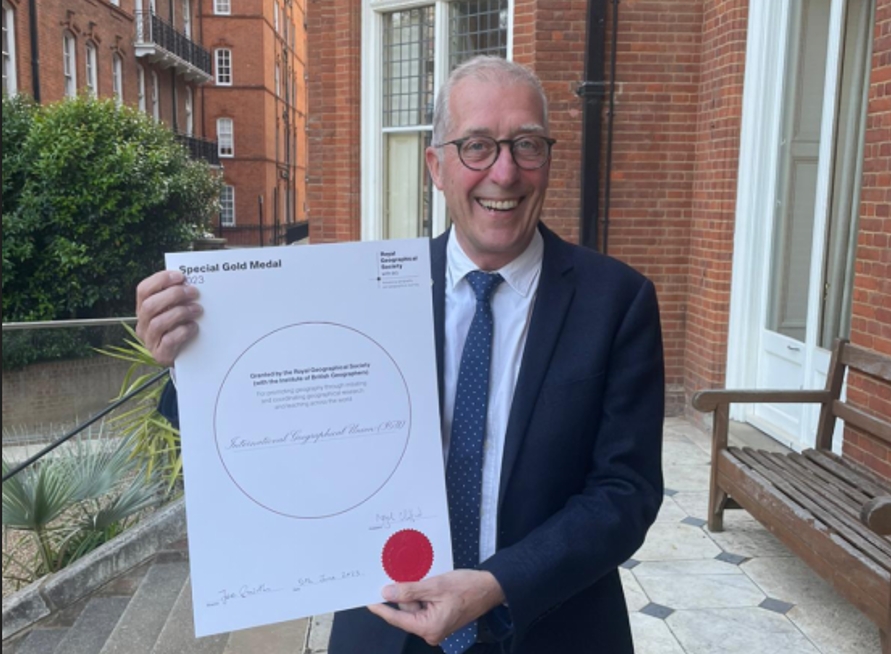Exploring Dynamics of Earth's Changes

Professor Michael Meadows receives the Royal Geographical Society's Special Gold Medal on behalf of the International Geographical Union. (COURTESY PHOTO)
By?LONG?Yun?&?ZHONG?Jianli?
"In my opinion, the ultimate goal of [scientific research] has to be about improving our relationship with the world that keeps us alive on this planet, which can be achieved through many different routes," well-known physical geologist Professor Michael Meadows told Science and Technology Daily. Currently, he is a dedicated researcher and educator at the School of Geography and Ocean Sciences at Nanjing University (NJU).
Adventurous and fun
Hailing originally from Liverpool, UK, Meadows' interest lies in understanding "how and why environments change over time." The last 20,000 years, including the Holocene and the ongoing Anthropocene, are his playgrounds. Based on his observation "as a person and a scientist," sustainability has become a pivotal theme in his work. "Environments are changing because of human impact. Geographers have a unique part to play in addressing environmental and socioeconomic sustainability," he said.
Challenges serve as an inevitable part in Meadows' research on physical geography. Because his work depends on fieldwork, it allows him to go on adventures in remote corners of the globe. He recalled an incident in which he fractured five ribs during a sediment coring assignment. He didn't complain, saying, "Fieldwork is an adventure and is great fun."
The culmination of his work gives people insights into the delicate balance between humans and nature. "The relationship between people and nature is breaking down," he said, calling for a reevaluation of our connection with nature and emphasizing that mismanagement poses risks not just to the environment but to humanity itself.
One of Meadows' notable contributions lies in his extensive research on an important wetland and lake located in the north of Cape Town, South Africa. His work shattered preconceptions by unveiling the lake's ecological history through sediment analysis. In fact, the seemingly pristine ecosystem was highly disturbed, with significant changes occurring centuries ago. "It had major implications for ecological management. The system is potentially very vulnerable," he said.
Awakening curiosity of students
According to Meadows, cultivating young talent in the field of physical geography requires more than just academic instruction, as it demands a mentor's ability to ignite curiosity and foster a partnership between teacher and student.
The scholar's task is clear: "Awakening curiosity in students is the challenge." He believes in injecting energy into lectures, turning them into a dynamic and entertaining performance. "Revealing the uncertainty of what we know to students is quite exciting," said Meadows. Rather than passively accepting information, he encourages students to question, explore, and dive into both the landscape and the academic literature.
What sets his approach apart is the personal engagement he values with students. "I want my students to ask me questions, even criticize my research," he said. To him, students are not just learners but partners in the research journey. Meadows always views his relationship with students as a collaborative partnership. "They're the ones doing the hard yards," he said.
When it comes to inspiring the next generation, Meadows painted a vivid picture of the evolving role of geographers. He stressed the value of a multidisciplinary approach in the interconnected world with environmental challenges. "Students who major in geology are increasingly attractive to employers," he noted, saying the broad and integrated thinking that geographers bring is becoming increasingly important across various sectors.
A dreamland for research
Reflecting on the challenges he faces, funding emerges as a pivotal aspect. Meadows mentioned his experiences in South Africa, emphasizing the difficulty of securing resources for research in developing countries. However, the landscape has evolved since he arrived in China. "To be honest, it's a dream [to conduct research] in NJU," he said. The resource transformation allows him to explore fields previously constrained by financial limitations.
Meadows's enthusiasm for his time in China is genuine. Having spent three years commuting to a Chinese university in Shanghai before joining NJU, he feels embedded in the NJU community. "I feel privileged to be part of that," he said, praising the excellent leadership and the outstanding co-workers in his field.
Meadows applauded the remarkable growth of China's academic achievements. In his field, China stands at the forefront globally. He said that sustainability studies are gaining prominence globally, with China becoming a recognized center, fueled partly by significant government investment.
As President of the International Geographical Union (IGU), Meadows sees international scientific cooperation as integral to the organization's mission. Celebrating over a century of existence, IGU aims to bridge geographical communities worldwide. "We want to bring Chinese geographies to the world and bring the world to Chinese geographies," he said, emphasizing the core philosophy of fostering global collaboration and networking.
This article is also contributed by ZHANG Rong, JIANG Peiye from NJU.







